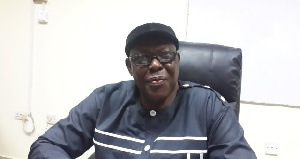 Chairman of the NMC, Nana Kwasi Gyan-Apenteng
Chairman of the NMC, Nana Kwasi Gyan-Apenteng
The National Media Commission (NMC) has kicked against moves by government to establish a company under its tutelage and appoint the board members as well as the Chief Executive Officer (CEO) to manage the platform of the impending Digital Terrestrial Transmission (DTT).
The regulator is of the view that the DTT platform constitutes a media and the power to appoint board members and CEO is vested in the NMC by the 1992 Constitution.
The NMC fears that if government is allowed to establish a company under its tutelage and appoint the board members as well as CEO, it would make the platform subject to the vagaries of politics and compel media organisations to do the biding of the government of the day.
Briefing the media in Accra yesterday, Chairman of the Commission, Nana Kwasi Gyan-Apenteng, cautioned government that continuing on its current trajectory would inevitably lead to the breaching of constitutional clauses which guarantee media freedom.
He stated that Article 167(c) of the Constitution enjoins the NMC to insulate the state-owned media from governmental control.
“The freedom that the media enjoy today didn’t just happen, people fought for it. What they are trying to do will send us back to the era before the 1992 constitution,” he added.
He told the gathering that the advent of this new technology had led to a twin track discussion in the lead up to the switch in transmission mode – technical and policy.
The technical discussions have been on such issues as network technology; consumer equipment; funding of infrastructure and other costs and how to use the free bandwidth.
The policy discussion dealt with issues of policy framework, since the new technology was going to “change the game so profoundly.”
This led to the production of many key documents that have sought to address the needs and views of different stakeholders in the TV business.
This means, therefore, that a digital signal multiplex must be established to terminate signals from all broadcasters, using the same frequency for transmitting digital TV signals to homes across the country.
The construction of this multiplex is currently being funded by the state.
He further stated that during the discussions and negotiations, the understanding had been that a special entity would be set up to manage the multiplex, whose board would be constituted of representatives of key stakeholders.
This issue of management and appointment of the Board and CEO of the new entity is at the core of the NMC’s anxiety.
“The new arrangement means that it is the multiplex that will transmit the signals produced by the content producers. The question is: Is that multiplex just a common carrier or a media entity? In other words, can we separate the BSD from the content it carries and treat them as two completely different entities or should the BSD be treated as an integral and inseparable part of the television production value chain?” he quizzed.
He stated emphatically that it was the NMC’s view that the digital platform is part of the TV production value chain, making the platform a part of the state-owned media assets, whose governance has been prescribed by the 1992 constitution.
“In its current form, the draft document produced by the Ministry of Communications proposes the formation of a company called the Central Digital Transmission Company Limited (CDTCL).
“This company will be under the direction of a board appointed by the President. The CEO is also to be appointed by the President,” he said.
This the Commission said is a violation of Article 168 of the Constitution, which vests the appointment of the Boards and CEOs of state-owned media in the NMC – in consultation with the President.
Additionally, the Commission insisted that as far as the Ghana Broadcasting Corporation’s TV programmes will be transmitted via the digital platform, the Communication Ministry’s proposals on appointments to the CDTCL will constitute a violation of Article 167 (C) which empowers the NMC to insulate state-owned media from governmental control.
The Commission asserted that beyond violating specific constitutional provisions, the proposal goes against the spirit of the Constitution and the nation’s drive to achieve even greater freedom and independence of the media.
Nana Gyan-Apenteng urged for a concerted effort to adhere strictly to the letter of the Constitution to remove all temptations the new situation will present for any government which will harbour dictatorial tendencies.